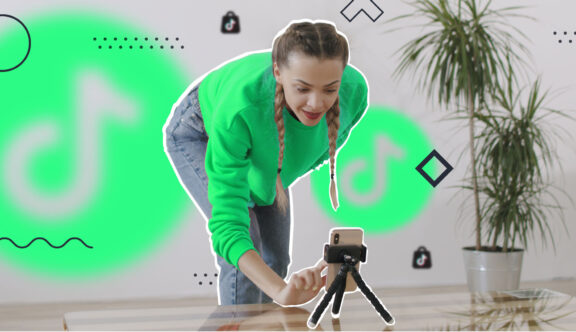Since its humble beginnings, TikTok has spawned countless viral dances, hashtag challenges, and been behind brand-boosting sales (such as Ocean Spray’s-sell out, thanks to the famous Fleetwood Mac Skateboarder).
An increasing number of celebrities are now associated with the platform. We’ve seen expensive productions from TikTok OG Jason Derulo (who has been creating content since the Musical.ly days), Gordon Ramsey’s energetic food reviews, and who could forget our favourite Disney stars Selena Gomez and Ashley Tisdale making an appearance.
Alongside the celebrities, we’ve also seen ‘normal’ TikTokers gain celebrity badge status, with Charlie and Dixie D’Amelio, Addison Rae and Bella Poarch now among the highest paid TikTok influencers. But even those have gone onto create TV shows and music, gaining a host of celebrity friends along the way. In short, TikTok’s influence on people’s lives can be tremendous, inspiring content makers to reach the top and claim stardom.
Celeb or regular person: Who does it best?
Those who are trying and succeeding are TikTokers such as Grace Keeling (GKBarry), Max Balegde and Issy Oakley. These TikTokers bring their audience along for the ride, aligning the user in their lives. This group has one thing in common: they are real. They are honest, share personal stories and give unbridled opinions on everything. Not only this, but they bring an element of comedy to their channels, which all in all, serve users the entertainment they seek from the platform.
So, what is the appeal of ‘normal influencers’ to brands?
Social media users crave authenticity and ‘realness’ and dislike the feeling that they’re being sold to. Celebrities and macro-influencers, who promote products and services, may well not be trusted by their audience, who – usually correctly – assume that they’re doing it for the paycheck. This is especially true when the product/service does not correlate to celeb’s personal brand or doesn’t reflect their values.
When celebs get it wrong
A good example is Gemma Owen, whose stint on Love Island saw her land the role of brand ambassador for Pretty Little Thing (PLT). Many ran to Twitter to share their opinions, many negative: that the brand didn’t suit her style or indeed her lifestyle, seeing as she sports more timeless and classic looks, rather than fast fashion.
OK, who gets it right?
But then we also have brands that get it so right! A great example is TikToker, Francis Bourgeois, whose fame blew up after his truly iconic train-based TikToks went viral. He went full steam ahead: from trainspotting life to collaborating on Gucci’s ad campaign.
Eccentric exploration was the story told behind this new Gucci campaign, which suited Francis down to a tee, his outdoor adventures and overall appeal to the gen Z audience. Having already built an audience through just ‘being himself’, this only served to increase the authenticity of the Gucci brand.
How brands can benefit from working with Tiktok influencers
Brands that choose influencers for their everyman appeal and don’t flaunt their new found fame and status are naturally more trusted by their audience. Those that keep it real and honest are the people that consumers want to buy from. Users rely on them for more truthful views and opinions to aid them when making decisions.
We have seen this with TikToker and influencer, GK Barry. Grace is now seeing sponsorship deals fly in wherever she promotes Hello Fresh in her podcasts, and shares discount codes from Look Fantastic in her Instagram Reels. She still brings the same energy and honesty to the ads as she does in any of her other videos, which is why brands love her – she instantly builds trust with their audience.
Another TikToker that users enjoy watching is Max Balegde, who first started creating TikToks at university, and since then, has grown his account to 3.2 million followers. Max brings a somewhat chaotic but charming energy to his videos, which is why his users adore him and his videos. Brands such as Jack Wills and Calvin Klein have jumped to work with Max, who also interviews celebs at red carpet events. Authentic and trustworthy is what comes to mind with Max, as he brings users with him every step of the way through his life, effortlessly providing entertainment value, and sharing real life situations with honesty and charm. No wonder he is rising to stardom quickly.
Should you work with ‘normal influencers’?
As marketers, it can be extremely tempting to reach out to influencers as a way of shaking up the marketing mix. Indeed, there are now a number of specialist agencies that make a living out of managing micro influencers and matching them with brands. If you, or your clients are asking the question: should we work with TikTok influencers, then the answer is ‘yes’ – but with some caveats:
Before you reach out…
- How well does the influencer suit your brand? Do their values match yours? It’s tempting to divert a big chunk of your marketing budget into a sponsored post by the latest reality show star, but do your due diligence before they post.
- What kind of relationship do the influencers have with their users? Is it the kind of interaction that you want to associate with your own brand?
- Look for authenticity. The more trust that influencers have with their fans, the more trust will transfer to your brand, and in turn, influence sales positively.
- Don’t assume you have to outsource. Your own company can be a brilliant source of user generated content. Many of your staff may already be building up their own loyal followings and have skills that get your brand noticed by new users.
Above all, keep it real. Remember: people buy from people.
Want to see how we’ve engaged our workforce on Tiktok? Follow us @strategiq.
